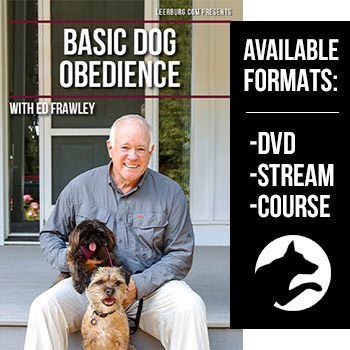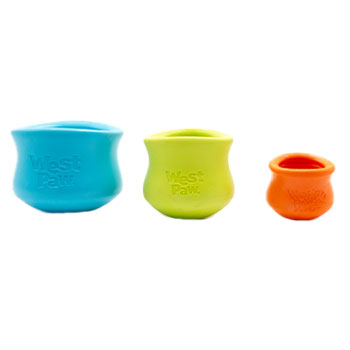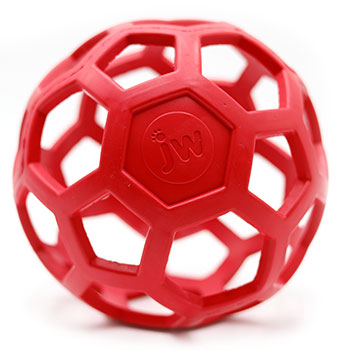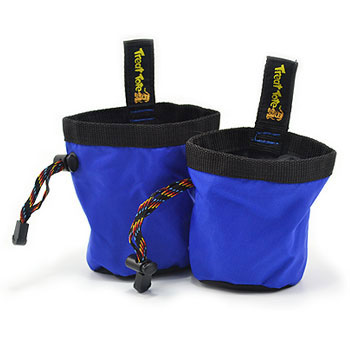April 21, 2011
How do we teach our new puppy to tell us when he needs to go outside?
Full Question:
We just got a puppy this past weekend. I have barely slept and ate, but it's getting better, especially after I found your web site today. We have been using a crate (made it smaller yesterday so it's more den-like) and today is my first day back at work. It's a short day today and tomorrow and then Thursday I'll be gone 8 hours but we're going to hire a dog walker for a few months.Anyway, he's very good with going outside, because I take him out often. He only needed to get up once last night, which was ok because I have to as well (being 11 weeks pregnant). He's in his crate in our room for now, but I plan to move him out to the living room as he can hold it longer and is used to be on his own. We ignore his whining (unless he needs to pee).
Now that I feel better about crate training, my question is how to get him to tell us. When I take him out, I tell him to "potty" (I know, kind of lame, but my parents used it and it stuck), and he always goes right away. I don't let him run around in our small fenced yard until after he goes, and I just kind of repeat potty until he goes, and then tell him how good he is when he goes. But I thought about it this morning that when we're inside, and about to take him out to pee we say "Want to go outside?" I wonder if this is confusing to him because outside we say "potty." Would it help if I start saying "potty" inside before we go out so he makes the connection? I thought of the bells thing but I'd rather him respond to me than have to ring a bell.
Thanks in advance and I really like your web site and it has put me at ease, and I don't feel like the next few months are going to kill me anymore.
Ginger

 Ed's Answer:
Ed's Answer:
I get a great many emails from people who have problems house training their dogs (both puppies and adult dogs).
So many that I recently created a web page that is a resource center for house training. It's a directory of house training information.
If you spend some time reading you will find the answer to your problem.
To put things in perspective a little, I compare pups to babies - little babies. How old does a baby have to be before it tells you it no longer wants to pee and poop in his pants? The answer is that this varies but older than a year and probably close to two.
People fall into the "TELL ME TRAP" when they should be in the mode of "TAKE THE PUP OUT EVERY HOUR OR SO" so the dog learns that if he holds it a little longer he will be able to go outside. And when he goes out - KEEP HIM ON LEASH. Teaching a dog to pee and poop on leash is a HUGE thing. In later life you will appreciate it.
Also - thanks for your business. I would strongly recommend that you get the 4 hour BASIC DOG OBEDIENCE DVD when it fits your budget. You have more to learn than your pup and I recommend that you start to educated yourself now rather than when the dog is 4 or 5 months old. I compare that to a teacher who tries to do a lesson plan the night before teaching a class. It just does not always work.
Here are some articles to read to help you: (I also mention these on the house training page)
I recommend that you go to my web site and read the article I wrote on my philosophy of dog training. I think you will get some good ideas there.
You may want to read the article I wrote titled The Ground Work to Becoming a Pack Leader. This is the protocol we use in our home when we raise a puppy for ourselves. It is also the part of the protocol we use to solving behavioral problems such as dominance and/or house breaking problems.
I recommend that you visit my web site and read a training article I recently wrote titled THE THEORY OF CORRECTIONS IN DOG TRAINING.
The reason I wrote this article was to help people understand how to motivate their dogs in training. Most people either use the wrong kind of correction or over correct dogs in training. I am not a fan of "force training" (although I most defiantly believe that every dog needs to go through a correction phase). By exploring corrections in training you will become a better dog trainer.
Good Luck with your pup.
So many that I recently created a web page that is a resource center for house training. It's a directory of house training information.
If you spend some time reading you will find the answer to your problem.
To put things in perspective a little, I compare pups to babies - little babies. How old does a baby have to be before it tells you it no longer wants to pee and poop in his pants? The answer is that this varies but older than a year and probably close to two.
People fall into the "TELL ME TRAP" when they should be in the mode of "TAKE THE PUP OUT EVERY HOUR OR SO" so the dog learns that if he holds it a little longer he will be able to go outside. And when he goes out - KEEP HIM ON LEASH. Teaching a dog to pee and poop on leash is a HUGE thing. In later life you will appreciate it.
Also - thanks for your business. I would strongly recommend that you get the 4 hour BASIC DOG OBEDIENCE DVD when it fits your budget. You have more to learn than your pup and I recommend that you start to educated yourself now rather than when the dog is 4 or 5 months old. I compare that to a teacher who tries to do a lesson plan the night before teaching a class. It just does not always work.
Here are some articles to read to help you: (I also mention these on the house training page)
I recommend that you go to my web site and read the article I wrote on my philosophy of dog training. I think you will get some good ideas there.
You may want to read the article I wrote titled The Ground Work to Becoming a Pack Leader. This is the protocol we use in our home when we raise a puppy for ourselves. It is also the part of the protocol we use to solving behavioral problems such as dominance and/or house breaking problems.
I recommend that you visit my web site and read a training article I recently wrote titled THE THEORY OF CORRECTIONS IN DOG TRAINING.
The reason I wrote this article was to help people understand how to motivate their dogs in training. Most people either use the wrong kind of correction or over correct dogs in training. I am not a fan of "force training" (although I most defiantly believe that every dog needs to go through a correction phase). By exploring corrections in training you will become a better dog trainer.
Good Luck with your pup.
No ratings yet
Was this Q&A helpful? Let us know!

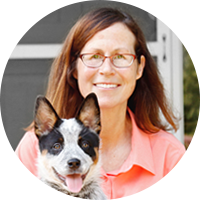
Can't find what you're looking for?



